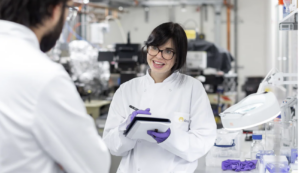She’s made 1,750 Wikipedia bios for female scientists who haven’t gotten their due
On a whim, Jess Wade typed out her first Wikipedia page five years ago. It was a biography of Kim Cobb, an American climatologist who — despite earning several scientific accolades — had never been written about on the popular online encyclopedia.
“I met her at a science event, and I was massively impressed,” said Wade, 33, a British physicist, who, after a quick search online, was stunned to see that Cobb had no profile on the public platform.
Wade had stumbled into something she found troubling: Cobb was one of countless deserving women whose names — and lengthy list of achievements — had yet to be chronicled on Wikipedia, the go-to site for an estimated 2 billion people a month who are seeking information about individuals, ideas and topics large and small.
Wikipedia is “used by pretty much everyone,” Wade said. She realized that “despite it being this incredibly important resource, it was suffering from a lack of content, particularly about women, but also about people of color.”
She decided to take matters into her own hands.
Since 2017, Wade has written more than 1,750 Wikipedia pages for female and minority scientists and engineers whose accomplishments were not documented on the site.
Wade said there’s still much work to be done.
Just 19 percent of English Wikipedia biographies are of women, according to WikiProject Women in Red, a group dedicated to addressing Wikipedia’s gender gap.
“Having people know who you are means you get more opportunities,” Wade said, adding that she wants to “make sure people’s stories were on there and in the public domain.”
Wade, a research fellow at Imperial College London, centers her work on Raman spectroscopy, a technique often employed in chemistry to identify molecules, among other uses. She has received several awards for her scientific contributions, and her Wikipedia page is robust with her many achievements.
Wade has made it her mission to correct gender and racial biases in the science community, and advocate for women in STEM, who make up only 28 percent of the workforce. Her activity on Wikipedia has been chronicled in the press, and she has written about her work in various publications, including The Washington Post.
“Wikipedia is a really powerful way to give credit to people who, for a long time, have been written out of history,” she said. “Not only do we not have enough women in science, but we aren’t doing enough to celebrate the ones we have.”
“We do an awful lot of talking about underrepresentation,” Wade added, “but not enough acting on it.”
